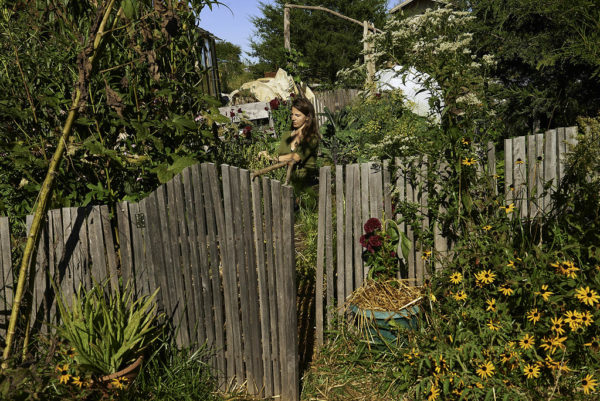Becoming the Change We Wish To See: A Dancing Rabbit Update
Published: Tue, 06/04/19

The March Hare
Updates and Articles from Dancing Rabbit Ecovillage
When I tell people I live in an ecovillage, I often hear, “Like a commune?” as a response. “Commune” is often times the only concept people have to place it on their mental map, and that term frequently connotes free love, drug usage, artsyness, and a general shirking of responsibility.
Avi here, attempting to shed some light on the ways in which discipline, structure, and responsibility are essential components in the life of a thriving community member at Dancing Rabbit Ecovillage. As the calendar turns to June, and the soil finally dries up after a couple merciful days of respite from the biblical series of storms that flooded many of the surrounding roads, the permaculture principle “make hay while the sun shines” guides me through my days.
Spring is a busy time in the garden cycle. The soil gets amended and worked, seeds are sowed, and seedlings get transplanted out into the field, where they brave the elements in an effort to grow bigger and stronger. In the last week, many of my plants outgrew the confines of their soil receptacles in the greenhouse, but my desire to move them to the field was drowned out, deluge after deluge, adding to my sense of dread at being behind. That anxiety has subsided a bit, as the last two rain-free days were spent weeding, seeding, transplanting, and mulching. My greenhouse is now home to a much smaller — in number and in size — plant community.
Keeping up with the cycle of animal agriculture is also demanding. Milk production is in full swing, and thus cheese-making to preserve our surplus. Batches of soft goat cheeses are being made one after another, and the more labor-intensive hard cheeses are being pressed and waxed with increasing frequency, before being set aside to age and provide a lingering taste of spring in the coming winter.
It’s worth mentioning that my passion for local, organic food production and food security is a non-income producing area of my life. In addition to all of the spring agriculture work (a robust part-time job in its own right) I make a living doing 7-10 hours of administrative work each week for our non-profit education and outreach organization: the Center for Sustainability and Cooperative Culture, teaching English as a second language online, editing translated articles, and helping out sporadically on a building project in the village.
A strict morning routine is the foundation for my ability to avoid burnout. I wake up early, before 6 a.m. most days, and get in a run or a yoga session before praying and starting my day. Squeezed into the gaps in the schedule are the numerous off-grid lifestyle household chores: scything, hauling water, and composting waste, just to name a few. Then there’s participating in community governance, helping neighbors, and reading up on subjects that interest me and help me manage my life. I also like to make time for playing games, of both the athletic and board varieties, with friends and supporting the people I’m close to by listening to what’s going on in their lives and encouraging them to find a way forward.
As you can imagine, sometimes it feels like I don’t get a break from problem solving and crossing things off my to-do list until my head hits the pillow around 9:45 pm. Without a doubt, my biggest challenges at DR this spring are time, energy, and resource management. I even started using a task-management software to help me integrate my various analogue records and lists.
Until this spring, my wife Anna and I lived together in Moscow, Russia. During the winter, my days were full of existential languishing in our snowed-in one-bedroom apartment. There was seemingly so little worth doing to occupy my time and contribute to my immediate surroundings. I consumed entertainment on Youtube a couple hours a day, plowed through classic Russian literature, and was almost always available to chat with far-away friends or family in my ample free time.
I’m finding that being a reliable and contributing ecovillager is demanding a level of organization, discipline, and endurance I’ve never known before. The reward for all of this focused and sustained effort is a deep and profound sense of purpose and meaning. Existential crisis barely has space to creep in. There are far more things worth doing in my environment than I have the time and energy to do. Like the newly germinated seedlings in my garden, the objects of my focus need to be thinned and given enough space in my life to grow into their full nourishing potential.
Some people see moving to an ecovillage, or a “commune,” as a way of dropping out of society, shirking civic and familial duty, and running away to a carefree existence. (There is an element of turning away from mainstream society that is undoubtedly true.) However, we Rabbits are also choosing to actively build and manage an entirely different way of life, along with all the physical and social infrastructure that supports it. We are engaged in the process of becoming the change we wish to see in the world; turns out that’s a demanding, and sometimes exhausting, process. It’s hard for me to imagine taking on more civic responsibility than that.
If you’re like Avi, and you want to become the change you wish to see in the world, sign up to spend two weeks with us through our visitor program. You’ll have a chance to meet lots of like-minded people, learn some new skills in areas ranging from gardening to non-violent communication, and have lots of fun along the way.
